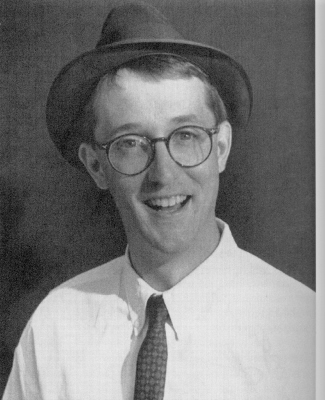
Keith Johnson |
Page 28 Summer 1995
|
Juggler,
Educator, Entrepreneur: The Totally Normal Life of
Keith M. Johnson BY
ELIZABETH BOARDMAN
When
I arrived at Keith Johnson's Providence, Rhode Island, home for our
interview, Mary, his wife
It's
been a busy month, Mary tells me once off the phone. Sixty-eight shows
in March alone, two or three a day, with a total of two days off. And
the phones are ringing non-stop. So much so that a second line was
being installed that afternoon. Keith arrives a few minutes later. You
couldn't miss his homecoming. Harry greets his Dad with a squeal of
delight.
It's
obvious that Keith is where he wants to be. He has a successful
business, a family and a home. After years of hard work, it's just as
he planned it.
He
started juggling at 12, teaching himself cascades, columns and wall
planes from Carlo's The
Juggling Book. In high school, he landed a job jestering
for a local medieval dinner theatre, where bottomless tankards of grog
made for a convivial crowd. Between juggling scarves and spinning
plates he learned that entertainment could be fun, unpredictable and
profitable.
"It
beat stocking shelves," Keith said, "though it was sometimes
difficult to concentrate on chin-balancing a plate while having my bum
pinched by women who'd had one too many bottomless tankards!"
Knowing
that he wanted to use these skills as the basis of his career, Keith
spent the early 1980s polishing his skills, studying with industry
leaders and performing. Of Ringling Brothers and Barnum & Baileys
Clown College (he is a 1983 graduate) he said, "I was
Although
Johnson credits Clown College with introducing him to a variety of new
skills, he knew he didn't want to be a Barnum & Bailey clown. The
idea of performing in huge rings far from his audience didn't thrill
him. He prefers more intimate settings, where he can entertain people
on a more personal level.
After
Clown College, a summer spent with Tony Montanaro at the Celebration Barn
helped Keith develop a performance style that was uniquely his own.
Everything fell into place at Roger Williams College (now Roger
Williams University), where Keith studied traditional theatre and
modern dance, creating a self-styled major in movement theatre. Dance
faculty members Kelly Wicke Davis and Gary Shore kept Keith busy,
dancing, choreographing, and developing performance art pieces. Keith
credits this rigorous program with helping him learn the mechanics of
putting an act on stage. "I became very aware
During
these years of training, Keith watched many performers choose tortured
lives. Their art seemed to spring from the constant disorder of
unhappy relationships. Or, if they had their personal lives together,
they lived out of a suitcase. Keith knew he didn't want a life like
that. He wanted a wife, a home,
Keith
realized he could have a real life and still do what he loved. His
goal became to work full time as a performer and still be home for
dinner every night.
In
1986, he founded Artful Enterprises in Providence, Rhode Island, and
started selling juggling and magic shows. Spending hours on the phone
making cold calls to nursing homes, he'd book a couple shows for each
week. He also did five or six birthday parties a weekend, something
many other performers sneered at. He's unrepentant. "Parties paid
the bills and allowed me to spend the rest of the week researching new
markets and learning to grow a business," he explained. |

Keith Johnson |